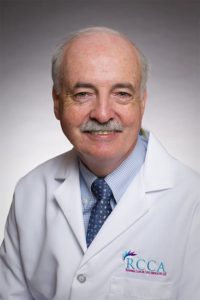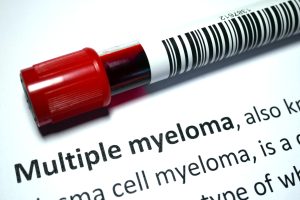
24 RCCA Physicians Named to 2025 Castle Connolly ‘Top Doctors’ List for Exceptional Cancer Care
A cancer diagnosis can be frightening. An individual may worry about how, or if, they will get better. The future becomes unclear and the strain
HIPAA Alert: Potential Data Breach Learn More
Questions on Oncology, Hematology and/or Infusion Clinical Services due to COVID-19 Crisis – CALL 833-698-1623
Important Information for Our Patients Regarding the Coronavirus.
RCCA Providing Area Cancer Patients with Access to Care During Coronavirus Outbreak
RCCA Offering Patients Virtual Visits During Coronavirus Pandemic
“What happens next?” “Where should I go for treatment?” They are questions physicians often hear after informing a patient that they have identified potential cancer.
Thousands of primary care physicians, gastroenterologists, dermatologists, Ob/Gyns, pulmonologists, urologists, and others have answered those vital questions by referring their patients to the medical oncologists and hematologists of Regional Cancer Care Associates (RCCA) – one of the nation’s largest networks of cancer specialists, serving patients in in New Jersey, Connecticut, Maryland, and the Washington, D.C., area.
Here are three reasons doctors refer patients to RCCA.


Denis Fitzgerald, MD, says one of the main reasons physicians refer patients to RCCA is that the network’s 25 community-based offices offer both convenience and access to cutting-edge care. “Twenty-five years ago, patients often had to go to a major medical center in New York City, Philadelphia, Boston, or Washington, D.C., to receive the latest therapies or participate in a clinical study. The burden, in terms of getting into the city, dealing with the traffic and parking, navigating a large hospital, and then traveling back home – often after having received chemotherapy or radiation therapy and not feeling well – could be overwhelming. Today, people with cancer can go to an RCCA office that may be just 10 or 20 minutes from their home, receive the same therapies and diagnostics offered at academic medical centers, receive care based on the same evidence-based protocols followed nationwide, and be back home in 10 or 20 minutes. Further, RCCA centers participate in more than 300 clinical trials, giving patients access to a wide range of studies evaluating emerging therapies for solid tumors and hematologic malignancies.”
Dr. Fitzgerald, a board-certified medical oncologist and hematologist who practices at RCCA’s Little Silver, NJ, office, adds, “Quality of life is a key consideration for people with cancer and their families, and I am proud that RCCA’s community-based centers are able to provide both the full range of therapies – including immunotherapies and targeted therapies – and the ability to receive great care close to home.”
This proximity to their care center can be particularly beneficial if a patient experiences a side effect following treatment, Dr. Fitzgerald notes. “Let’s say someone is having significant vomiting or diarrhea and becomes dehydrated following chemotherapy. If they are being treated at an academic medical center in Manhattan or Philadelphia, their options are to travel back into the city in that condition or to go to their local hospital’s Emergency Department, where the physicians may not have access to the patient’s full medical records and may have trouble contacting the person’s oncologist.” By contrast, he says, “If the patient is receiving treatment from a nearby RCCA office, he or she can quickly and easily return to the office for assessment and care, such as receiving fluids intravenously. And if care in the local hospital’s ED is required, the RCCA medical oncologist likely will be on staff at that hospital, with both the oncologist and the patient’s records readily available to emergency medicine physicians.”

Building on the example that Dr. Fitzgerald cites, Paul Bannen, MD, notes that there are considerable advantages to referring a patient to an oncologist who practices in the same hospital and with the same primary care physicians and specialists that the patient normally sees.
“As community-based oncologists, we tend to know our patients’ primary care physicians, their cardiologists and endocrinologists, urologists, Ob/Gyns, and other clinicians. We see those doctors while making rounds at the hospital or attending meetings. They often have our cell phone numbers and we have theirs. That familiarity with one another goes a long way toward ensuring effective communication. Also, patients often derive considerable reassurance and contentment from the fact that their doctors know each another and can be in touch easily,” says Dr. Bannen, a board-certified medical oncologist who practices at RCCA’s offices in Olney, MD, and Rockville, MD. In many cases, he adds, RCCA oncologists and referring physicians will use the same electronic medical records (EMR) platform, which can be of great help in reviewing lab results, medication history, and other data critical to decision-making.
Dr. Bannen adds that beyond being close to referring physicians in a strictly geographic sense, RCCA’s cancer specialists stay close to their patients’ other clinicians in terms of providing comprehensive, coordinated care.
“I can’t recall the last time I saw a patient who didn’t have at least one comorbidity,” says Dr. Bannen. “While my focus is on the patient’s cancer, I am acutely aware of how my treatment plan may affect a patient’s other conditions, or cause drug-drug interactions. At RCCA, we do not take on management of non-oncologic diagnoses or change medication regimens that another physician has prescribed for a patient’s chronic conditions. Rather, we get in touch with the other doctor, explain our treatment plan and its implications, and reach agreement on the best way to proceed.”
The medical oncologist adds that this commitment to collaboration extends to serving as a resource for patients’ ongoing care. “Thanks to the dramatic advances in treatment we have seen in recent years, there are almost 20 million cancer survivors in the United States. This is a wonderful situation, but it means that primary care clinicians, cardiologists, and others need to be aware of and manage the potential long-term effects of cancer and its treatment, such as the cardiotoxicities that may develop years after receipt of certain chemotherapies. At RCCA, we always are available to talk with other physicians about topics such as risk factors for various sequelae of treatment, surveillance strategies, and approaches to risk mitigation. Similarly, we are happy to provide a second opinion if a patient contacts them because he or she is uncertain about a treatment plan that another cancer center may have recommended.”
Dr. Fitzgerald adds, “A final point I would note is that I believe all physicians, whatever their specialty, do their best to treat their patients the way that they would want to be treated, the way they would want their loved ones treated. At RCCA, each patient is well known to everyone from the receptionist they see when they walk through the door to the lab technicians, medical assistants, nurses, and doctors they see subsequently. We recognize and honor each person’s individuality, just as we tailor our treatment plans to each person’s specific medical needs. I firmly believe that this is the best way to provide care to someone dealing with cancer and the best way to achieve the best outcomes possible for that person. It also may be the best reason to refer a patient to RCCA.”
***************
Dr. Fitzgerald and Dr. Bannen are among 100+ medical oncologists and hematologists who practice with RCCA at 25 locations across New Jersey, Connecticut, Massachusetts, Maryland, and the Washington, D.C., area. RCCA’s cancer specialists see more than 30,000 new patients each year and provide care to more than 265,000 established patients, collaborating closely with those patients’ other physicians. RCCA physicians offer patients innovative therapies, including immunotherapies and targeted therapy, as well as access to approximately 300 clinical trials. In addition to serving patients who have solid tumors, blood-based cancers, and benign blood disorders, RCCA care centers also provide infusion services to people with a number of non-oncologic conditions—including multiple sclerosis, Crohn’s disease, asthma, iron-deficiency anemia, and rheumatoid arthritis—who take intravenously-administered medications.
To learn more about RCCA, call 844-410-7301 or contact RCCA today.
For more information or to schedule an appointment,
call 844-346-7222. You can also schedule an appointment by calling the RCCA location nearest you.

A cancer diagnosis can be frightening. An individual may worry about how, or if, they will get better. The future becomes unclear and the strain

Multiple myeloma (MM) is a rare type of blood cancer that often develops without early symptoms, making awareness of risk factors essential. Regional Cancer Care

A cancer diagnosis can bring a wide range of emotions, from fear and stress to sadness and hope. These feelings are a natural part of

Regional Cancer Care Associates is one of fewer than 200 medical practices in the country selected to participate in the Oncology Care Model (OCM); a recent Medicare initiative aimed at improving care coordination and access to and quality of care for Medicare beneficiaries undergoing chemotherapy treatment.